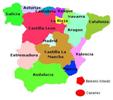How is this for an oath of allegiance to one’s monarch?
“We, who are as good as you, swear to you, who are no better than us, to accept you as our king and sovereign lord, provided you observe all our liberties and laws — but if not, not.”
 I’ve been reading Robert Hughes’s 2004 Barcelona: The Great Enchantress. Barcelona is the second largest city in Spain and the capital of the Catalan province, which has traditionally asserted a great deal of independence from the central authorities in Madrid.
I’ve been reading Robert Hughes’s 2004 Barcelona: The Great Enchantress. Barcelona is the second largest city in Spain and the capital of the Catalan province, which has traditionally asserted a great deal of independence from the central authorities in Madrid.
The Catalans, as far back as the late medieval era, were among the first to re-establish democratic and republican political institutions. By the late 1200s, Barcelona was governed by a committee of seven individuals with varying powers along with a council of approximately one hundred citizens from all walks of life, as Hughes puts it, coopers, textile traders, “cobblers and bakers as well as bankers and the upper mercantile orders.”
Barcelona, with its excellent port and location on the Mediterranean, became a wealthy trading center and in keeping with its nascent democratic-republican polity developed a plucky spirit of independence. While it was not able to escape entirely the centralizing powers that aggrandized the authority of the monarch in Madrid, it was able to submit with some self-respecting grace, as the wonderful oath above indicates.
 In keeping with that spirit of liberty, wealth, and self-assertiveness, Barcelona also developed an impressive arts and architecture culture, as the soaring Santa Maria del Mar cathedral, begun in the 1300s, indicates.
In keeping with that spirit of liberty, wealth, and self-assertiveness, Barcelona also developed an impressive arts and architecture culture, as the soaring Santa Maria del Mar cathedral, begun in the 1300s, indicates.
Don’t forget that your buddy Salvador Dali was a Catalan!
I’ve been trying to ignore that fact.